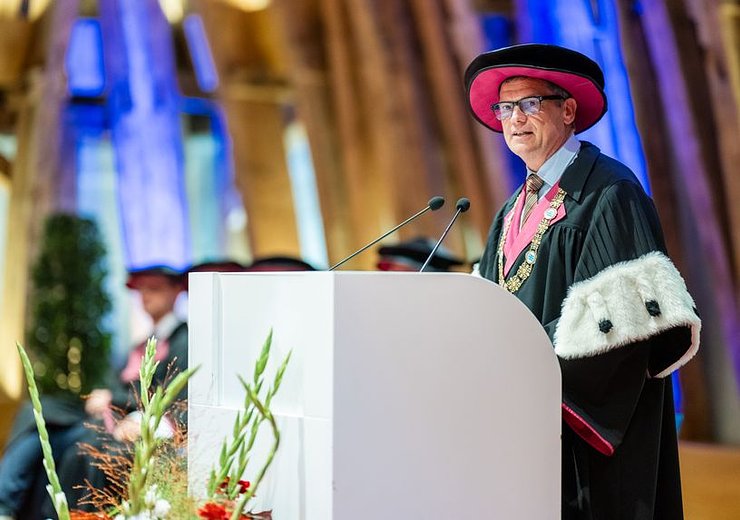Markus Nissl Receives Sub Auspiciis Doctorate
On October 9, Markus Nissl received his doctorate sub auspiciis. His thesis on Knowledge Graphs was supervised by Emanuel Sallinger.

Picture: Klaus Ranger / TU Wien Informatics
On October 9, Markus Nissl received his doctorate sub auspiciis, a recognition for exceptional academic achievements, under the auspices of the rectorate of TU Wien. His doctoral Thesis “Temporal reasoning in knowledge graphs: Artificial intelligence systems for reasoning with time in Vadalog” was supervised by Emanuel Sallinger.
“For me, this award is a very significant recognition of a long and intensive journey. Although my primary goal was never getting this award, but to learn as much as possible and to take this knowledge with me after graduating, I am very pleased to have received this award. For me, it is representative of my curiosity, my tireless motivation to learn more and gain a deeper understanding of things, and to make progress. It also stands for the difficult moments from which I have drawn new strength, for a bit of luck, and for the end of an intensive phase of my life that I can now celebrate. At the same time, it is the starting point for new, exciting and hopefully challenging tasks, which I will dedicate myself to with just as much enthusiasm,” says Markus Nissl.
Congratulations to Markus Nissl for this extraordinary achievement!
Abstract
The rise of knowledge graphs has sparked great interest in providing scalable and efficient reasoning capabilities for a variety of problems. A particularly prominent language supporting scalable reasoning techniques is Vadalog, which supports advanced reasoning capabilities such as existential quantification, recursion as well as aggregation, probabilistic reasoning, and various data sources and has demonstrated its value in numerous financial applications, including company control and golden power checks. In all of these applications, time is a critical dimension to gain a deeper understanding of the structural changes. However, so far, Vadalog is missing the support for dealing with temporal information, limiting its applicability in temporal contexts. The absence of such functionality is emphasized by the resurgence of temporal reasoning in the context of stream reasoning through DatalogMTL, an extension of Datalog with operators from the metric temporal logic. Yet, since DatalogMTL is a merely extension of Datalog, it lacks many of the capabilities necessary for knowledge graph reasoning. As a result, in this thesis, we conduct the first study on how to extend DatalogMTL towards its application in knowledge graph reasoning. For this purpose, we first study extensions of DatalogMTL, namely aggregation and existential quantification, which are fundamental to numerous data science workflows. In detail, we define formal syntax and semantics, explore different possibilities for aggregating along the timeline as well as examine a natural as well as a uniform semantic for existential quantification. Subsequently, we present a novel benchmark generator that is the first of its kind which is capable of supporting the generation of benchmarks for metric temporal logic, together with recursive queries, aggregation and existential quantification. This allows us to generate targeting instances for testing specific scenarios and edge cases. Afterwards, we augment Vadalog with the ability to reason with metric temporal logic providing a fully engineered reasoning architecture. We evaluate the system with benchmarks generated from our generator as well as from real-world instances. The results show that our system outperforms state-of-the art solutions in most of the scenarios. Finally, we discuss the usage of DatalogMTL as specification language of smart contracts, enabling the use of DatalogMTL for decentralized finance, an interesting domain for knowledge graph reasoning.
About Markus Nissl
Markus Nissl received his bachelor’s and master’s degrees, as well as his doctorate sub auspiciis, from TU Wien Informatics. He is CEO and Managing Partner at Markus Nissl Consulting GmbH, which he founded in 2013, and since 2020, he has also been working on the WWTF-funded project Scalable Reasoning in Knowledge Graphs, lead by Emanuel Sallinger.
Curious about our other news? Subscribe to our news feed, calendar, or newsletter, or follow us on social media.



